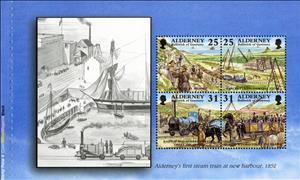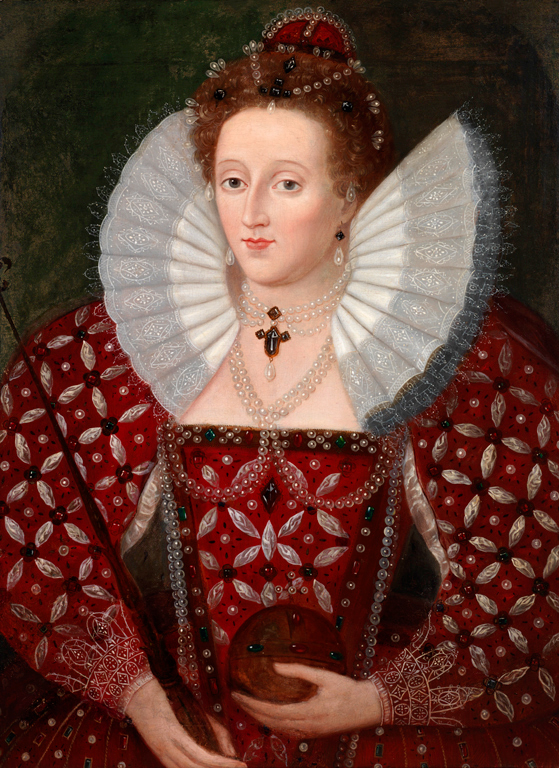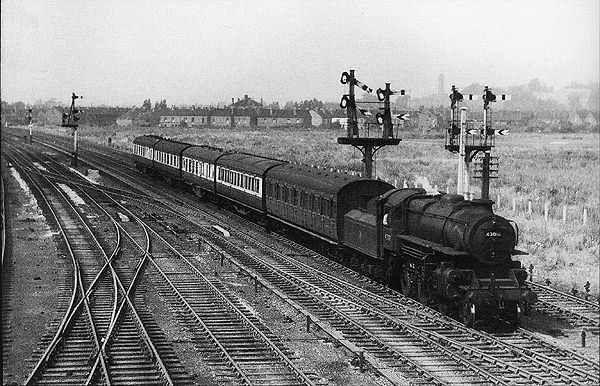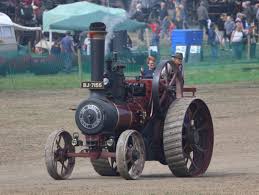Booklet Pane: Alderney's first steam train at new harbour, 1852 (Alderney 1997)
Alderney's first steam train at new harbour, 1852 (Alderney 1997)
20 November (Alderney ) within release Garrison Island 1998 - Historical Events goes into circulation Booklet Pane Alderney's first steam train at new harbour, 1852 face value 2*25_2*31 Guernsey penny
| Booklet Pane Alderney's first steam train at new harbour, 1852 in catalogues | |
|---|---|
| Michel: | Mi: GG-AL HB9 |
| Stamp Number: | Sn: GG-AL 113c |
Booklet Pane is horizontal format.
Booklet pane from Booklet "Mi:GG-AL MH6"Also in the issue Garrison Island 1998 - Historical Events:
- Booklet Pane - Alderney's first steam train at new harbour, 1852 face value 2*25_2*31;
- Booklet Pane - Detail of the new harbour from 19th century face value 2*18_2*26;
- Booklet Pane - Fort Albert seen from Braye Bay, 1890's face value 2*26_2*31;
- Booklet Pane - The Old Harbour at Braye, 1890's face value 2*18_2*25;
Booklet Pane Alderney's first steam train at new harbour, 1852 it reflects the thematic directions:
An anniversary is the date on which an event took place or an institution was founded in a previous year, and may also refer to the commemoration or celebration of that event. For example, the first event is the initial occurrence or, if planned, the inaugural of the event. One year later would be the first anniversary of that event. The word was first used for Catholic feasts to commemorate saints. Most countries celebrate national anniversaries, typically called national days. These could be the date of independence of the nation or the adoption of a new constitution or form of government. The important dates in a sitting monarch's reign may also be commemorated, an event often referred to as a "Jubilee".
The horse (Equus ferus caballus) is one of two extant subspecies of Equus ferus. It is an odd-toed ungulate mammal belonging to the taxonomic family Equidae. The horse has evolved over the past 45 to 55 million years from a small multi-toed creature, Eohippus, into the large, single-toed animal of today. Humans began to domesticate horses around 4000 BC, and their domestication is believed to have been widespread by 3000 BC. Horses in the subspecies caballus are domesticated, although some domesticated populations live in the wild as feral horses. These feral populations are not true wild horses, as this term is used to describe horses that have never been domesticated, such as the endangered Przewalski's horse, a separate subspecies, and the only remaining true wild horse. There is an extensive, specialized vocabulary used to describe equine-related concepts, covering everything from anatomy to life stages, size, colors, markings, breeds, locomotion, and behavior.
A people is a plurality of persons considered as a whole, as is the case with an ethnic group or nation. Collectively, for example, the contemporary Frisians and Danes are two related Germanic peoples, while various Middle Eastern ethnic groups are often linguistically categorized as Semitic peoples.
Queen - the title of reigning female monarch or the wife of the king in a number of countries
Railways - Transportation system made up of metal rails which is designed to allow trains to maneuver on the tracks from one location to the next.
A traction engine is a steam-powered tractor used to move heavy loads on roads, plough ground or to provide power at a chosen location. The name derives from the Latin tractus, meaning 'drawn', since the prime function of any traction engine is to draw a load behind it. They are sometimes called road locomotives to distinguish them from railway locomotives – that is, steam engines that run on rails.






